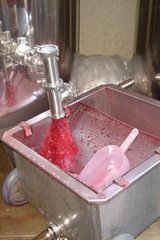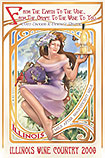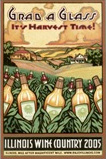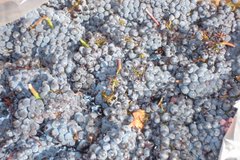Being in the wine business, any new movie featuring food and wine gets my attention! So I decided to ask my boss, a devout foodie and owner of Lynfred Winery, if he was going to take his grandkids to go see the new Disney cartoon ‘Ratatouille’. He said he had not heard of it. I, of course, said ‘oh, you HAVE to go! Not only would your grandkids love it but so would you!’ He then asks what it is about. This is where everything goes downhill.
The first words out of my mouth were ‘so it’s about this rat who wants to be a chef’. That is all I needed to say, before I could go on he was talking about how horrifying that must be, the travesty! ‘A rat as a chef? Ridiculous!’ Needless to say, I made him watch the trailer and he’s already planning a date with the grandkids.
So that leaves me with the pondering question. How will people perceive a wine with a rat on it? Well, if it goes over as well as the movie has, I would predict quite well. Here’s an article I found regarding the new ‘Ratatouille Chardonnay’:
July 26 (Bloomberg) -- Will a cartoon-movie rat on the label of a French-made chardonnay entice drinkers to pick it up?
We'll find out next week, when 2004 Ratatouille, named for Disney-Pixar's charming animated foodie flick, goes on sale for $12.99 at Costco stores in 18 U.S. states. This licensed bottling ushers in what may be a whole new trend for wine and the movies.
Plenty of films feature real wine brands, including 2004's ``Sideways,'' which doubled sales of California pinot noir. That's why wineries use product-placement agencies to get their labels on the screen.
The 2004 Ratatouille is the reverse version of this promotion strategy: It's the first movie-branded wine, and it's going retail.
The Disney wine doesn't spring from anything specific in the film's story of an ambitious young country rat named Remy who has haute-cuisine dreams and finally makes it as a four-star chef in Paris. The few wines in the film are big-deal bottles. I spotted a Cote-Rotie, a 1961 Chateau Latour and, in the scene when feared restaurant critic Anton Ego orders the legendary 1947 Cheval Blanc, what turns up on his table is Lafite- Rothschild.
Ratatouille wine is more modest, a crisp white from the Macon region of Burgundy. Louisiana-based importer D.C. Flynt M.W. Selections, which handles many wine projects for Costco, sourced the wine from an historic estate, Chateau de Messey. Owner Marc Dumont produced it from grapes in his Cruzille vineyard and put the movie label on a mere 500 cases of his regular Bourgogne chardonnay.
Costco Wine Program
The wine tie-in idea surfaced at a Disney-Costco summit in California, says Annette Alvarez-Peters, who oversees the Issaquah, Washington-based retail chain's wine program. She is coy about financial arrangements with Disney, but a typical licensing royalty is 8 percent to 12 percent of the retail price. Given the small numbers, it's hard to view the wine as more than a promotional gimmick.
But there may be a future for a limited number of movie- and TV-branded wines on retail shelves. Surely the wineries featured in ``Bottle Shock'' and ``The Judgment of Paris,'' two films now in production, will pick up on the idea and offer movie-labeled cuvees when they hit theaters next year. Both tell the story of the famous 1976 tasting in Paris when a handful of California wines beat out the best of France.
The future for real brands on the screen seems bright. Producers and set designers may be influenced by gift bags with free bottles, but serendipity sometimes reigns.
Free Publicity
Consider the appearance earlier this year of Kendall- Jackson Vintner's Reserve cabernet in the opening scene of a TV episode of ``The New Adventures of Old Christine.'' Star Julia Louis-Dreyfus pulls out a bottle hidden under her bathrobe, announces she's keeping ``Mr. Kendall Jackson'' company tonight and takes the bottle into her bedroom.
``I nearly fell out of my chair,'' recalls George Rose, head of public relations for the giant California winery, who was watching the show. He says L.A. product-placement agencies call regularly, pitching a $100,000 budget to place the brand, but this, he reports gleefully, ``cost us nothing.''
For tiny brands, the results can be big. When Demi Moore seduced Michael Douglas with a Napa Valley cult chardonnay, 1991 Pahlmeyer, in the 1994 thriller ``Disclosure,'' owner Jayson Pahlmeyer was inundated. ``I could have sold 400,000 bottles,'' he says, ``but I only made 400 cases.'' Pahlmeyer provided two free cases to the film and paid no fee.
Product Placement
Usually, though, an ``integrated entertainment marketing'' agency is the go-between. Six years ago, Napa Valley's Clos du Val was the first small winery to pursue on-screen product placement, and it paid an agency, Set Resources of Culver City, California, a $5,000 monthly retainer. Soon after, James Gandolfini was pouring Clos du Val on ``The Sopranos.'' Since late 2005, the wines have appeared in 25 TV shows and nine films, including recent figure-skating comedy ``Blades of Glory.''
Clos du Val's distinctive terra-cotta-colored label is easy to identify on the screen, where instant recognition is essential. Champagne Mumm's Cordon Rouge, with its red sash on the label, has a long movie history -- from the Bogart and Bergman scene in ``Casablanca'' (where he says ``Here's looking at you, kid'') to the more recent ``Pearl Harbor'' and ``A Beautiful Mind.''
Hollywood sells, so the bottles of 2004 Ratatouille will surely go quickly. The mystery is why Disney got involved. Profit on 6,000 bottles is a blip in the hundreds of millions the company will earn from consumer products in fiscal 2007. Maybe it's part of Disney's push to attract sophisticated adults with items like furniture.
On the other hand, how sophisticated is a cartoon rat? For movie-magic chardonnay, if budget is no object, I think I'll stick with 2005 Pahlmeyer ($70), which doesn't have a rodent on the label.










